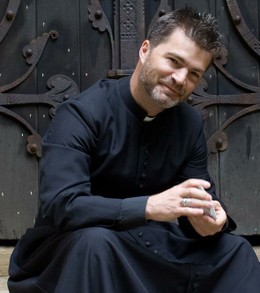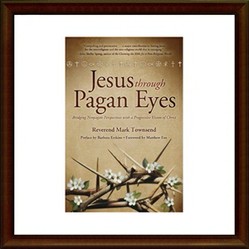 I have followed a Pagan religion for over 20 years, and during that time have had to explain and justify my beliefs many, many times for people who either cannot or do not want to understand why I choose to hold beliefs outside of the "norm". Invariably, at some point when some are questioning me on what I believe and why the question will arise "Don't you believe in Jesus?"
I have followed a Pagan religion for over 20 years, and during that time have had to explain and justify my beliefs many, many times for people who either cannot or do not want to understand why I choose to hold beliefs outside of the "norm". Invariably, at some point when some are questioning me on what I believe and why the question will arise "Don't you believe in Jesus?"
My response leads to further confusion for the questioner, because I always respond to the positive. Yes, I do believe that Jesus, the man, lived and died around the Sea of Galilee around 2000 years ago. Yes, I do believe that he was a great man and that he performed great miracles. I believe that he was an Enlightened Soul who taught much about loving one another and finding our soul connections to Spirit. But, I don't worship him and I am not a Christian.
Jesus is one of many prophets, holy men, and Ascended Masters from different times, different places, and difference religions who has lived on this Earth. We have a tendancy to discount as "untrue" teachings put forth from those who follow religious beliefs different from our own, and to put forward as being "infallible" truth those teachings put forth from followers, or founders of religious beliefs the same as our own. But, at their heart, the words of all of these teachers and prophets has been the same - Be kind to each other. Take care of those who need taken care of. Feed the hungry. Heal the sick. Love your fellow man.
In reading Jesus Through Pagan Eyes I was able to clarify some of the thoughts and ideas I had held about this man over the years. I actually went through and answered the interview questions put towards other Pagans within the third section of the book. You can read my responses to those questions at This Pagan's View of Jesus


 I have followed a Pagan religion for over 20 years, and during that time have had to explain and justify my beliefs many, many times for people who either cannot or do not want to understand why I choose to hold beliefs outside of the "norm". Invariably, at some point when some are questioning me on what I believe and why the question will arise "Don't you believe in Jesus?"
I have followed a Pagan religion for over 20 years, and during that time have had to explain and justify my beliefs many, many times for people who either cannot or do not want to understand why I choose to hold beliefs outside of the "norm". Invariably, at some point when some are questioning me on what I believe and why the question will arise "Don't you believe in Jesus?"

 If you are a Christian who is seeking to find a better understanding of the founder of your beliefs, then this is a book you need to read.
If you are a Christian who is seeking to find a better understanding of the founder of your beliefs, then this is a book you need to read.




 Bromley Council Recycleson 12/19/2013
Bromley Council Recycleson 12/19/2013
 Clean Your House With Just 3 Natural Ingredientson 12/18/2013
Clean Your House With Just 3 Natural Ingredientson 12/18/2013
 Growing Up in Smalltown Americaon 12/17/2013
Growing Up in Smalltown Americaon 12/17/2013
 What Makes Me An Organised Mumon 12/15/2013
What Makes Me An Organised Mumon 12/15/2013



Your thoughts
I have ordered the book from Amazon and intend to read it, and I will prioritize it in the list I am committed to reading.
You are, of course correct, that the issue should not be sidelined too much by a discussion of Francis of Assisi. However, I was named after him and I was raised for a while in a Franciscan parish, so I have an interest in him, and I have a general interest in nature spirituality, with which he is associated.
I am not an expert on St Francisof Assisi. I am using the words that were used by the uthor of this book, Mark Townsend. I feel that to debate the merits of whether or not this one man should or should not be called "Priest" and whether or not he would have taken on such a title for himself rather detracts from the knowledge we could all learn from reading this book.
Francis would not have thought of himself as a priest, as he considered that he was unworthy of the rank, though he was more worthy than some of the priests in his time and ours. Deacon is one step below priest. He was pressed to take ordination as a deacon, but his humility prevented him from going further to ordination.
In one sense all Christians are priests, as they share in Christ's priesthood. We call this the priestood of all believers, which Catholicism underplays, I think to its detriment. Nevertheless, if you want to say that Francis was a priest, are you using the word in a sense different from the Christian or Catholic usage? What then do you mean by describing him as a priest.
St Francis is considered by many to have been a priest, duly ordained and officially recognised as such or not. Perhaps he was not officially a Catholic Priest, but he was a priest nonetheless.
I must make a minor correction to this article. Francis of Assisi was never ordained a priest, the highest that he ever went was deacon. You can be a member or founder of a religious order without being a priest.
This sounds original and I will be having a look at the book, though I do have a large backlog of books to read at the moment.
I had not heard of Mark Townsend, he sounds like a very interesting character!